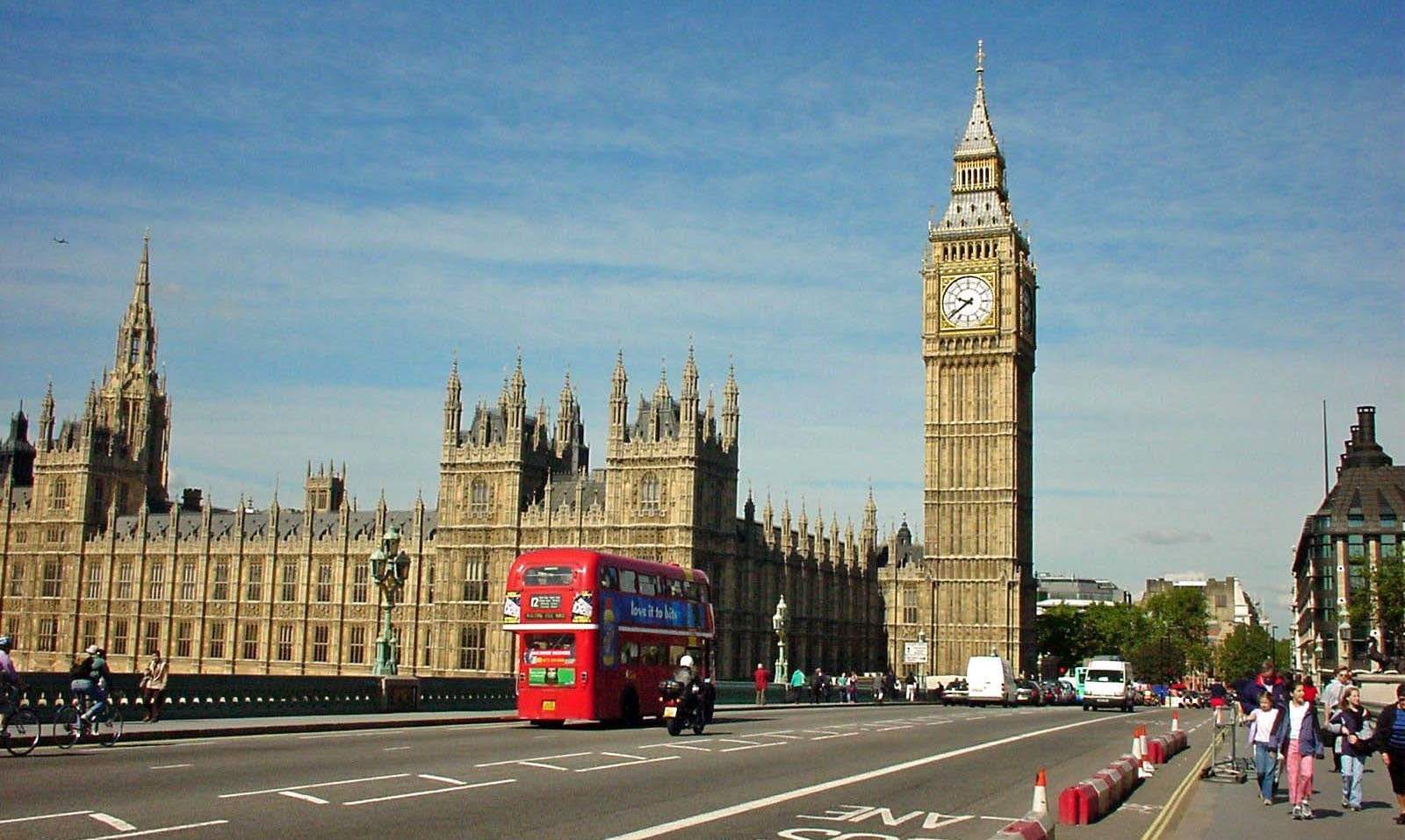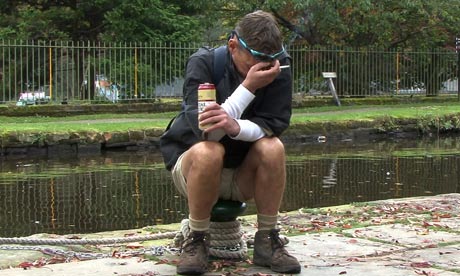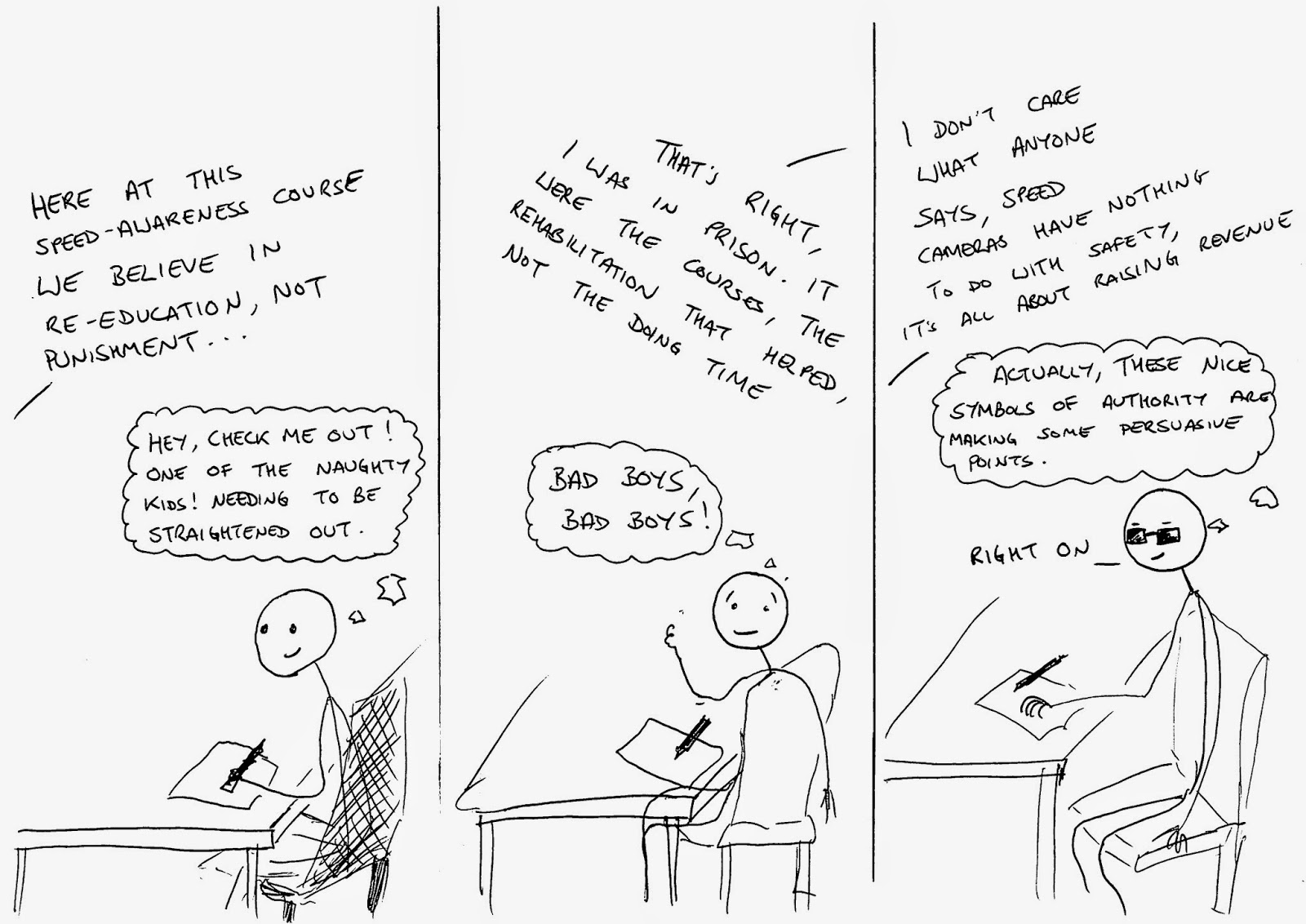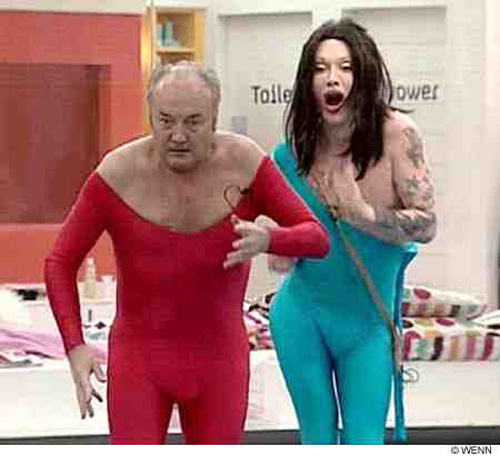Thursday, 11 September 2014
Monday, 8 September 2014
Ha! Of course another blog.
Hey kids, I've got another blog on the go. It's Yorkshire-focused, but hopefully not too niche. It's taking a broad view, not "best curry in Shipley".
Anyway, latest thing is about imagery and canonical places. If you're ever interested in what I write here you might be interested in what I write there.
Sunday, 10 August 2014
Coming to terms with Leeds
Leeds isn’t cool.
Other similar cities have had their “moment”: Liverpool in the early ‘60s and ‘80s, Manchester in the late ‘80s/early ‘90s. Leeds hasn't had a moment.
West Yorkshire should be more closely associated with the British filmmaking New Wave -- Tony Richardson is from Shipley, Keith Waterhouse is from Leeds -- but although some of the best examples were filmed here they tended to be set in general “Northern Land” rather than Leeds (/Bradford/Halifax).
Other cities have their bands. The obvious Manchester and Liverpool ones… Sheffield has Pulp, Human League, even the Arctic Monkeys.
Leeds has The Kaiser Chiefs, who are too well known to be cool, and The Wedding Present, who probably aren’t well known enough. There was a time in the late ‘90s when the “Superclub” was a thing, and Leeds had a few of those, but tastemakers quickly reclassified them as naff. Bad luck, Leeds.
 |
| Having it in Majestyk's, Leeds |
Leeds is hard to root for.
It’s not small enough to be an inspiring underdog. It’s not far enough away to be exotic, like Newcastle.
And the football team! Everyone hates the football team. Dirty Leeds. Violent Leeds. Racist Leeds.
| A Leeds United Fan |
What looks like general dislike of Leeds is actually distaste. It’s just so common.
A terrific counterweight to the anti-Leeds narrative is Promised Land: A Northern Love Story by Anthony Clavane. It’s the story of a city, its football team, and its once large, now dwindling, Jewish population.
Clavane argues that Don Revie’s Leeds United belong with those other northern influences which made the ‘60s: Harold Wilson, Billy Liar, the Beatles, David Hockney, the Liverpool poets etc etc.
Yes, Revie’s team. Any reference to which is described by Giles Smith as:
The nuclear option. There is, quite simply, nowhere to go after that. There has never been a more horrible team.
This is an embedded view, deepened by The Damned United: Clough’s beautiful spirit crushed by Revie and Leeds.
There is another version of this story. Leeds, under Revie, went from second division to first division runners up in 3 years, winning the title four years later. A team which replaced its kit so it could be more like Madrid. A team with ambition who did everything necessary to win. And why shouldn't they? Why should they settle for being the team the rightful winners play against?
This Leeds was an insurgent, revolutionary force, loathed by the establishment. Why does public opinion side with the establishment on this one? Clavane tells us the FA (public school Corinthians) were:
Appalled by Revie. They considered his attempt to develop a ruthless, fiercely competitive, hard-headed winning machine to be, at best, ungentlemanly. At worst, they claimed, it heralded the game’s loss of innocence.
This Leeds reminds me of Chelsea. Chelsea were popular when they were losing gallantly under Ranieri. When Mourinho took over and they too became a winning machine, the greatest team of the modern era, people went off them. It doesn’t do to upset the natural order. Chelsea had money too, of course, but how else are you going to do it nowadays?
 |
| Don't they look young. |
Anyway, Revie eventually left Leeds and they became mediocre (and still disliked).
Actually, for a while they were both good and popular. In the late 90s and early ‘00s they had a dashing young team terrorising Europe. That team was part of the North’s last “moment”, when its cities made a play to turn themselves into city break destinations, the Superclubs were dominant and London seemed a little bit staid. Clavane is very good at tying this all together, with the team part of a rebranded outwards-looking Leeds.
Then the club imploded, to widespread delight. It's worth considering what exactly it was that people were so happy about.
The Fall of Leeds was presented as some kind of early noughties morality tale, a parable of greed, excess and hubris. How deluded to think they could build a team to match the citadels of Manchester and London, let alone Milan and Madrid.
Now the South and the establishment has reasserted itself entirely.
Let us not fall into the traps set by the forces of conservatism. Let us not disdain Leeds. Let us celebrate Leeds the Upstart! Leeds the Dreamer! Leeds the Beautiful!
Let us not fall into the traps set by the forces of conservatism. Let us not disdain Leeds. Let us celebrate Leeds the Upstart! Leeds the Dreamer! Leeds the Beautiful!
A few such moments.
1) One month in ’72 Revie’s Leeds beat Nottingham Forest 6-1, Manchester United 5-1 and Southampton 7-0. The last of these is famous. You’ve seen the clips before, but they’re always worth a couple of minutes of your time. The goals are on the first video. Not great quality, but you can see what’s going on. (Music by T-Rex, the least Leeds band ever.) I’d suggest you go straight to the second video and soak up the showboating (from 6 minutes).
2) Some Cantona greatness from his season at Leeds (so not repeated beyond impact); 21 seconds in.
3) And that time when for a few weeks in the mid-90s Tony Yeboah was the best player in the world.
Wednesday, 30 July 2014
Jose Mourinho don't impress me much, and what is it with butterflies?
We, the English-speaking peoples, assume that each language is different, and you either speak it or you don't. That's our experience of learning.
There's no other language where we would follow the gist without having studied it. People sometimes say Frisian. Best of luck.
For many non-English speakers this is not the case. The Scandinavians can understand each other, the various branches of the Slavic languages are mutually intelligible, Hindi/Urdu etc.
A Spanish friend recently told me that he could understand around 70% of Portuguese and Italian, though he'd never had a lesson in either.
Check it out. Here's how you say "it is a cat":
Spanish: Es un gato
Portuguese: É um gato
Italian: È un gatto
Come on, you're not even trying to make it different! These aren't different languages, these are accents!
One of the reasons why Jose Mourinho can speak five languages (English, Portuguese, Spanish, Italian, French) is that three of them are pretty much the same.
So while native English speakers are rubbish at learning languages, that's partly because there are no quick wins for us. Any new language is harder for an English-speaker than Spanish, Portuguese or French would for the Italian.
However. Whichever language you come from you need to buckle down and learn the word for butterfly. It's completely different in each major European language.
Look at spider, nice and easy:
Fr: araignée
There's no other language where we would follow the gist without having studied it. People sometimes say Frisian. Best of luck.
For many non-English speakers this is not the case. The Scandinavians can understand each other, the various branches of the Slavic languages are mutually intelligible, Hindi/Urdu etc.
A Spanish friend recently told me that he could understand around 70% of Portuguese and Italian, though he'd never had a lesson in either.
Check it out. Here's how you say "it is a cat":
Spanish: Es un gato
Portuguese: É um gato
Italian: È un gatto
Come on, you're not even trying to make it different! These aren't different languages, these are accents!
One of the reasons why Jose Mourinho can speak five languages (English, Portuguese, Spanish, Italian, French) is that three of them are pretty much the same.
 |
| Speaks about 2.5 languages |
However. Whichever language you come from you need to buckle down and learn the word for butterfly. It's completely different in each major European language.
Fr: araignée
Sp: araña
It: ragno
German goes with "Spinne", which is fine - you can see the common root with English (and obviously arachnid with the Romance "languages").
But check out the humble butterfly. What the fuck's going on here?
Eng: butterfly
Fr: papillon
Sp: mariposa
It: farfalla
Ger: Schmetterling
Why did we all feel the need to make up our own word for this guy?
Wednesday, 25 June 2014
Proclaiming the Proclaimers are brilliant
The original title of this post was "The Proclaimers: Britain's most underrated band?"
After spending a bit of time "researching" on YouTube I realise I sell them hilariously short. They are obviously Britain's most underrated band. And they will continue to be so until British popular opinion catches up with the obvious: they are the only British band to give the Fall any competition as the greatest ever.
Allow me to make my case…
After spending a bit of time "researching" on YouTube I realise I sell them hilariously short. They are obviously Britain's most underrated band. And they will continue to be so until British popular opinion catches up with the obvious: they are the only British band to give the Fall any competition as the greatest ever.
Allow me to make my case…
Friday, 13 June 2014
Thursday, 12 June 2014
Aspergers Test
Lifestyle tip #1: Buy your winter coat today!
Are you going to need a new coat this winter? Buy it now. No one's buying coats today.
Here's a US military surplus peacoat on eBay.
It is almost certainly better than your coat.
Here's a US military surplus peacoat on eBay.
It is almost certainly better than your coat.
Saturday, 7 June 2014
70s Beatles: Wolfish Grin (not) released in 1973
No Beatles album for two years probably created impossible expectations. What seemed, post-Ziggy, a little disappointing can now be appreciated as a very solid album. There are a few missteps, but here is a band fully operating as a band, as the famous artwork suggests. Still, for the first time they weren't driving popular culture forward.
Though it was always billed as "some time off" the truth was no one really knew if there would be another Beatles album. It was Ringo who worked to bring everyone back together, and his new leadership is reflected in his increased presence on the album.
Side A
1) SINGLE PIGEON
Not a dramatic start to the album. May explain the critical under appreciation.
2) JOHN SINCLAIR
Lennon brings the politics and edge.
3) THE LORD LOVES THE ONE (THAT LOVES THE LORD)
George still deep in his hippy stage.
4. PHOTOGRAPH
New writing partnerships were finally happening within the band. Ringo wrote this one with George.
5. JET
Lennon hated it, refused to play on it or let it be a single. Surely would have been a hit. My 4 year old son's favourite Beatles song.
6. MIND GAMES
Lennon insisted in this as the single. First real Beatles flop.
Side B
1. I'M THE GREATEST
Seemed a little vainglorious at the time but this is the biggest band in the world, back after a break.
2. LITTLE LAMB DRAGONFLY
3. GIVE ME LOVE (GIVE ME PEACE ON EARTH)
Hippy George.
4. OUT THE BLUE
Gentle, soppy Lennon.
5. LET ME ROLL IT
As I say, it's a decent album, but no real arguments that they were going off the boil.
Listening to these "Beatles" "albums"
Unfortunately I can't do Spotify playlists -- Lennon's a holdout -- but here you go, YouTube playlists for the ones I've done so far.
Newsagent Bacon?
Puck!
Newsagent Bacon?
Puck!
70s Beatles: Puck! (not) released in 1971
After the critical and commercial success of Newsagent Bacon? the Beatles came back reinvigorated with Puck! You can guess what Lennon wanted to call it. Thankfully the others' commercial instincts and Starr's newfound interest in Shakespearean comedy (playing Bottom in Peter Brook's Old Vic production of that year) led to the compromise title.
McCartney and Lennon, though still stripped back, embraced a fuller sound on this record. Their new confidence led to a reduction in Harrison's presence. Harrison and Starr still had something of a backlog to work through (because they hadn't released any solo albums of course, wink).
Imagine was released as a non-album single, so don't worry about finding it here.
Side A.
1. GIVE ME SOME TRUTH
Stomping, politics. Lennon's back.
2. ISN'T IT A PITY
George may have been marginalised on this release, but he secured second song status.
3. HEART OF THE COUNTRY
4. JEALOUS GUY
John's first big single in a while.
5. UNCLE ALBERT/ADMIRAL HALSEY
Side B
1. WITHOUT HER
Ringo given the kick-off track, for once. Nice one, Ringo!
2. CRIPPLED INSIDE
3. DEAR BOY
Another McCartney song whose effortlessness puts us off a bit.
4. OH YOKO!
John really insisted this one was on the record. Almost split the band up over it.
5. THE BACK SEAT OF MY CAR
Breaking character a bit, but isn't it a choker that this wasn't the way history panned out?
6. ALL THINGS MUST PASS
McCartney and Lennon, though still stripped back, embraced a fuller sound on this record. Their new confidence led to a reduction in Harrison's presence. Harrison and Starr still had something of a backlog to work through (because they hadn't released any solo albums of course, wink).
Imagine was released as a non-album single, so don't worry about finding it here.
Side A.
1. GIVE ME SOME TRUTH
Stomping, politics. Lennon's back.
2. ISN'T IT A PITY
George may have been marginalised on this release, but he secured second song status.
3. HEART OF THE COUNTRY
With his usual literalism Paul came up with this. He was, indeed, still living in the country.
4. JEALOUS GUY
John's first big single in a while.
5. UNCLE ALBERT/ADMIRAL HALSEY
A return to the song suite style of Abbey Road closes out the side.
Side B
1. WITHOUT HER
Ringo given the kick-off track, for once. Nice one, Ringo!
2. CRIPPLED INSIDE
3. DEAR BOY
Another McCartney song whose effortlessness puts us off a bit.
4. OH YOKO!
John really insisted this one was on the record. Almost split the band up over it.
5. THE BACK SEAT OF MY CAR
Breaking character a bit, but isn't it a choker that this wasn't the way history panned out?
6. ALL THINGS MUST PASS
This song was the last word from the Beatles for two years, leading to much speculation that they were done. As we know, this wasn't the case, and they returned in '74 with Wolfish Grin.
70s Beatles
Yeah. I'm going to do this, I think. There's a great 1971 album out there, and 1973. Maybe I'll burn a few CDs and do a giveaway.
Now, let's say the Beatles hadn't broken up. Their next album.
Couple of years back I had this idea of starting a new blog. A blog dedicated to a counter history in which instead of breaking up the Beatles had taken some time out and decided to keep it going, producing themselves with guest help.
I figured it was possible to get at least another 10 Beatles albums by cobbling together the '70s solo work. I was going to design artwork and everything.
Bonkers.
I just found an iTunes playlist for a suggested line-up. I'm not an enormous Beatles fan, but it's quite fun to listen to these songs. They're like Beatles songs, but not so overfamiliar you can't hear them anymore. This is the order I put them in back then. I'm not going to go through and edit again. You may disagree with these - I may too.
OK, here we go, the Beatles' next album: NEWSAGENT BACON?. I think it's at least as good as half of their other albums, and a nice way of getting the pleasure of listening to the Beatles without the crushing cultural weight of THE BEATLES.
SIDE A:
1. WHAT IS LIFE
George was only going to rejoin if he had a bigger influence in the band. So they let him kick it all off.
2. EVERY NIGHT
Paul had been taking it easy in a farm. Mood change! Pretty, inconsequential. McCartney!
3. REMEMBER
And here's Lennon. This isn't a brilliant song, but then again, there was always a load of filler on Beatles' albums (Doctor Robert, Run for Your Life, about a third of the White Album).
4. TEDDY BOY
Macca again. Frankly, Macca's are all a bit throwaway, but lovely in their way.
5. HOLD ON
Sounds a bit like a Paul song. Is John. Potential single. John needs one, hard to see where else it's going to come from.
6. BEAUCOUPS OF BLUES
You have to stick Ringo somewhere. May as well be here. Not actually terrible. For Ringo.
7. MY SWEET LORD (SINGLE)
And a big single from George to finish the side.
SIDE B:
1. MAYBE I'M AMAZED (SINGLE)
Paul kicks off Side B with their biggest single in years. Consider this the demo for a full Beatles production.
2. LOVE
Brings it down a bit. This might be a B-Side.
3. JUNK
4. ISOLATION
Paul and John taking it in turns at the moment.
5. WAH WAH
George brings the energy up! He was allowed 3 songs. This is his third. Not as good as the other two.
6. MAN WE WAS LONELY
Self-referential Beatles talk from Paul. They always need one of these.
7. MOTHER
Lennon insisted this be first or last on the album. The others decided last was best. More easily skippable.
Now, wasn't that fun? Might do this again.
UPDATE:
OK, here's the backstory. After Let It Be is released the Beatles are on the verge of breaking up. Peace was brokered over 10 days of air-clearing in the Welsh Black Mountains. This summit goes down in Beatles history as "the Erics", brokered as it was by Erics Clapton and Idle. Yoko is accepted, George's contribution publicly acknowledged and Ringo… carries on as before. Paul and John decide to make stripped back low-key statements and ride on the back of George's stuff for one album, at least. They make a break with the '60s by deciding to move on from George Martin's production. From now on their albums will have several producers, all under the guiding hand of "The Beatles".
I figured it was possible to get at least another 10 Beatles albums by cobbling together the '70s solo work. I was going to design artwork and everything.
Bonkers.
I just found an iTunes playlist for a suggested line-up. I'm not an enormous Beatles fan, but it's quite fun to listen to these songs. They're like Beatles songs, but not so overfamiliar you can't hear them anymore. This is the order I put them in back then. I'm not going to go through and edit again. You may disagree with these - I may too.
OK, here we go, the Beatles' next album: NEWSAGENT BACON?. I think it's at least as good as half of their other albums, and a nice way of getting the pleasure of listening to the Beatles without the crushing cultural weight of THE BEATLES.
SIDE A:
1. WHAT IS LIFE
George was only going to rejoin if he had a bigger influence in the band. So they let him kick it all off.
2. EVERY NIGHT
Paul had been taking it easy in a farm. Mood change! Pretty, inconsequential. McCartney!
3. REMEMBER
And here's Lennon. This isn't a brilliant song, but then again, there was always a load of filler on Beatles' albums (Doctor Robert, Run for Your Life, about a third of the White Album).
4. TEDDY BOY
Macca again. Frankly, Macca's are all a bit throwaway, but lovely in their way.
5. HOLD ON
Sounds a bit like a Paul song. Is John. Potential single. John needs one, hard to see where else it's going to come from.
6. BEAUCOUPS OF BLUES
You have to stick Ringo somewhere. May as well be here. Not actually terrible. For Ringo.
7. MY SWEET LORD (SINGLE)
And a big single from George to finish the side.
SIDE B:
1. MAYBE I'M AMAZED (SINGLE)
Paul kicks off Side B with their biggest single in years. Consider this the demo for a full Beatles production.
2. LOVE
Brings it down a bit. This might be a B-Side.
3. JUNK
4. ISOLATION
Paul and John taking it in turns at the moment.
5. WAH WAH
George brings the energy up! He was allowed 3 songs. This is his third. Not as good as the other two.
6. MAN WE WAS LONELY
Self-referential Beatles talk from Paul. They always need one of these.
Lennon insisted this be first or last on the album. The others decided last was best. More easily skippable.
Now, wasn't that fun? Might do this again.
UPDATE:
OK, here's the backstory. After Let It Be is released the Beatles are on the verge of breaking up. Peace was brokered over 10 days of air-clearing in the Welsh Black Mountains. This summit goes down in Beatles history as "the Erics", brokered as it was by Erics Clapton and Idle. Yoko is accepted, George's contribution publicly acknowledged and Ringo… carries on as before. Paul and John decide to make stripped back low-key statements and ride on the back of George's stuff for one album, at least. They make a break with the '60s by deciding to move on from George Martin's production. From now on their albums will have several producers, all under the guiding hand of "The Beatles".
Tuesday, 3 June 2014
Allsop, women, university and missing the point
So everyone's losing their shit about Kirsty Allsop saying that girls should think about not going to university at 18, but instead working, getting a flat, having kids. Some of the unspoken assumptions in the responses:
I think we can probably agree that we've all got carried away with (2). A voice suggesting a different path is not going to roll back votes for women.
I'm leaving (3). Obvious that there are different ways to live a happy life.
Now, (4). We tend to think that university is a good thing, that people benefit from it, and the more people we can get there the better. More women, more ethnic minorities: we're on our way to a better society!
However, I have a hunch... Power is increasingly entrenched; more women going to university is a signal not of progress, but of the lessening importance of a university education in amassing real power.
A degree does not increase your options, it changes them. Most graduates will go on to work for big companies and institutions. They will earn steady salaries in return for corporate drudgery. They will do the housework of capitalism, they will not be its masters.
Now, on (1), turns out Kirsty Allsop IS worth listening to, on this point, anyway. Not because she is a public figure, but because she is very posh. Posh people have power. They know other powerful people. If they're cooling on university it's not because they have been displaced by bright kids from Tower Hamlets. They know things.
Power's elusive. Any institutional route is a bait and switch.
- Kirsty Allsop is worth listening to on this.
- Her opinion will counteract the (overwhelming) societal pressure to go to university.
- Having children young is regressive and disempowering to women.
- Going to university is A Good Thing.
 |
| Allsop! |
I'm leaving (3). Obvious that there are different ways to live a happy life.
Now, (4). We tend to think that university is a good thing, that people benefit from it, and the more people we can get there the better. More women, more ethnic minorities: we're on our way to a better society!
However, I have a hunch... Power is increasingly entrenched; more women going to university is a signal not of progress, but of the lessening importance of a university education in amassing real power.
A degree does not increase your options, it changes them. Most graduates will go on to work for big companies and institutions. They will earn steady salaries in return for corporate drudgery. They will do the housework of capitalism, they will not be its masters.
 |
| Bet you're glad you did that degree. |
Power's elusive. Any institutional route is a bait and switch.
Here! Have a degree, it's the keys to the kingdom!May as well join the army instead. At least you'll get taught how to ski.
Right. Got the key. Now, where's that kingdom?
Monday, 2 June 2014
Mandy Pantinkin: crops up more frequently than you'd expect
We've been watching a lot of Criminal Minds recently.
It's no good. The characters are stock-types, the stories silly. It's completely unrealistic.
What a relief! How soothing to spend time with something designed to entertain you, something which isn't always demanding your nodding respect.
Now, careful. I'm not recommending it. The stupidity:quality ratio is fine for us, but your mileage may vary. Still, I think it's probably a good idea for everyone to have a Criminal Minds in their lives. It needn't be this one. Choose your own Criminal Minds.
It's no good. The characters are stock-types, the stories silly. It's completely unrealistic.
What a relief! How soothing to spend time with something designed to entertain you, something which isn't always demanding your nodding respect.
Let's raise a toast to the unchallenging. To the loose ends tied up in a big bow. To the good-looking characters cracking wise. To the exciting. To the fun! To the things which can be both laughed-at, and legitimately enjoyed.
Now, careful. I'm not recommending it. The stupidity:quality ratio is fine for us, but your mileage may vary. Still, I think it's probably a good idea for everyone to have a Criminal Minds in their lives. It needn't be this one. Choose your own Criminal Minds.
Friday, 30 May 2014
Weekend TiVo / Sky Plus Round-up
We've just been given a TiVo box. Didn't want it. Don't need it. But technology is foisted on you nowadays. I'm looking to see what I might record over the weekend and never get round to watching. Thought I'd stick it here. POTENTIAL REGULAR FEATURE.
1) Clydebuilt: The Ships that Made the Commonwealth
"Commonwealth"? Just say Empire. I love Scotland. I love the idea of watching all of these.
2) World Cup's Best Ever Goals, Ever!
This will be rubbish and full of stuff you've seen before. But it's great to have in the archive. It'll come into its own one time a friend's over and we're drunk.
3) Buddy Rich: Live in '78
Buddy Rich is tremendous.
4) Audition
When's going to be the right day to watch this? Never. Still, may as well have it there, nagging me.
5) Ghost Town
I actually really like this film. Would be nice to have it around. Other than the Office, easily the best thing that Gervais has done.
1) Clydebuilt: The Ships that Made the Commonwealth
"Commonwealth"? Just say Empire. I love Scotland. I love the idea of watching all of these.
2) World Cup's Best Ever Goals, Ever!
This will be rubbish and full of stuff you've seen before. But it's great to have in the archive. It'll come into its own one time a friend's over and we're drunk.
3) Buddy Rich: Live in '78
Buddy Rich is tremendous.
4) Audition
When's going to be the right day to watch this? Never. Still, may as well have it there, nagging me.
5) Ghost Town
I actually really like this film. Would be nice to have it around. Other than the Office, easily the best thing that Gervais has done.
Thursday, 29 May 2014
My Dad
Today I found out the best thing about my Dad. Before each holiday he fires up Microsoft Flight, checks out the destination airport and runs through a few landings. Just in case.
Brilliant.
Monday, 26 May 2014
Do we all like Phil Collins nowadays, or is that a bit 5 years ago?
I can't remember where we all are with Phil Collins. We used to hate him (can't remember why, his popular music, I think, and that divorce by fax) but then we realised that African American people liked him, and African American people are the coolest of all people. That was confusing.
Then he popped up on This American Life being all vulnerable and wise, and we figured maybe we'd got him wrong.
But then everyone said that he was good, actually.
So presumably it's time to say he's shit again. I lose track.
Anyway, here he is (via Slate) singing in front of a band full of middle school kids at his sons'… something, probably a prom. That's nice, right?
Then he popped up on This American Life being all vulnerable and wise, and we figured maybe we'd got him wrong.
But then everyone said that he was good, actually.
So presumably it's time to say he's shit again. I lose track.
Anyway, here he is (via Slate) singing in front of a band full of middle school kids at his sons'… something, probably a prom. That's nice, right?
Labels:
america,
culture,
kids,
phil collins,
taste
Friday, 23 May 2014
Pick sexier leaders and save democracy
If Boris Johnson, George Galloway and Nigel Farage have taught us anything, it's the enduring British affection for a rogue.
There's something deep within us which will forgive you anything, provided you look like you'd buy a round in the pub, could share a joke with a taxi driver, and know one end of a woman from the other.
You could call it charm. Or confidence.
Or, brace yourself, sexiness. You may recoil in horror from the idea, but truth is, these men do have sex appeal. Maybe not to you, but they've done well for themselves.
You may hate them, but it's hard to deny they have a certain alpha-maleness; and it's silly to deny that people respond to that.
Now, here's a problem.
Those who choose the leaders, the political class, the media, are the most immune to the charms of the alpha male (or female) so their success always comes as a surprise. The (culturally) middle class tend to be resentful of charisma, mainly because in its youth it was an unpopular, though self-regarding, spod.
The working and upper classes hate the cultural middle class. Sad, but true.
It's not jealousy; it's because the (cultural) middle class are the least sexy and least charming of all classes. Indeed, they deny the existence of sexiness or charm. They look for their leaders to display things like ideological purity, moral seriousness, all the while wearing terrible ill-fitting suits. Outside of the group this is very confusing.
To the cultural middle class Ed Miliband as Labour leader makes sense. To everyone else it is baffling, verging on insulting. THIS GUY? You are JOKING!
The electorate doesn't give a fuck about the Labour leader's credentials - they want to be swept off their feet by someone dashing, someone who'll repeatedly let them down then look them in the eye, and make them feel like there's no one else in the world but them. A wink. I can't stay mad at you.
Who in the Labour party can you imagine seducing anyone? I mean, other than a drunk researcher on the last evening of a conference. Blair's problem was not his transgressions - it was his protestations of wide-eyed innocence. If he'd managed a wink, a shrug, a leak of that Wendi Deng thing, he'd still be in power.
We can't let the fringe parties (UKIP, Respect, Conservatives) have the monopoly on charisma. We need sexy bastards in the mainstream. Are there any out there? Suggestions in the comments.
There's something deep within us which will forgive you anything, provided you look like you'd buy a round in the pub, could share a joke with a taxi driver, and know one end of a woman from the other.
You could call it charm. Or confidence.
Or, brace yourself, sexiness. You may recoil in horror from the idea, but truth is, these men do have sex appeal. Maybe not to you, but they've done well for themselves.
You may hate them, but it's hard to deny they have a certain alpha-maleness; and it's silly to deny that people respond to that.
Now, here's a problem.
Those who choose the leaders, the political class, the media, are the most immune to the charms of the alpha male (or female) so their success always comes as a surprise. The (culturally) middle class tend to be resentful of charisma, mainly because in its youth it was an unpopular, though self-regarding, spod.
The working and upper classes hate the cultural middle class. Sad, but true.
It's not jealousy; it's because the (cultural) middle class are the least sexy and least charming of all classes. Indeed, they deny the existence of sexiness or charm. They look for their leaders to display things like ideological purity, moral seriousness, all the while wearing terrible ill-fitting suits. Outside of the group this is very confusing.
To the cultural middle class Ed Miliband as Labour leader makes sense. To everyone else it is baffling, verging on insulting. THIS GUY? You are JOKING!
 |
| Really? |
Who in the Labour party can you imagine seducing anyone? I mean, other than a drunk researcher on the last evening of a conference. Blair's problem was not his transgressions - it was his protestations of wide-eyed innocence. If he'd managed a wink, a shrug, a leak of that Wendi Deng thing, he'd still be in power.
We can't let the fringe parties (UKIP, Respect, Conservatives) have the monopoly on charisma. We need sexy bastards in the mainstream. Are there any out there? Suggestions in the comments.
Tuesday, 20 May 2014
Soured Beets
I was going to spend my lunch writing this thing about culture, and cultural imperialism, and how it's important to notice it's not just the things you don't like which are trampling over native cultures, but we had a load of beetroot in the fridge so I decided to make some sour beets instead.
Recipe
We had a couple of turnips knocking around so I stuck those in too. Fight the power.
Recipe
- Grate
- Salt
- Jar
- Leave
We had a couple of turnips knocking around so I stuck those in too. Fight the power.
Saturday, 17 May 2014
Thursday, 15 May 2014
Cartoons!
For those of you who remember my bursts of cartooning in 2004, 2007 and 2010, I've tracked them all down from various sites and stuck them on a Tumblr.
Several are no good, but together they form an autobiography of sorts so I've kept them in.
Any new ones I do will go there (and, most likely, here).
Several are no good, but together they form an autobiography of sorts so I've kept them in.
Any new ones I do will go there (and, most likely, here).
Thursday, 8 May 2014
The importance of a non-London specificity
Right. This post is not bemoaning the lack of non-London set drama. This is about specificity.
Everyone has a mental map of London, even if they've never been there (the Gherkin and banks are over there, theatres are somewhere else, the museums and parks and Buckingham Palace). Everyone in Britain has seen thousands of images of London, and, crucially, they have been labelled LONDON.
The problem with the rest of England is that its images are seen, but they are rarely tagged to place.
There was an article about this in the LRB the other month. France is much better at giving its provincial towns identity. Here stories are either in London, or in a hazy non-London.
Why I think this is important!
Specificity confers legitimacy. Despite its complexity London is simply easier to visualise than anywhere else in the UK. Because of this (I theorise), and leaving economic considerations to one side, people are more likely to move there after university because they can picture themselves there. It becomes the only feasible destination for internal migration.
It's also subtly easier to support investment projects like Crossrail or a new airport as we can imagine what it might look like and how it'd fit in to our existing mental model. Consider a Crossrail which went from Liverpool to Hull. The national mental image would be something like:
And you know, the images we're missing don't even have to be positive. The Olympics is one thing, but deprivation in Tower Hamlets, gangsters, riots - it all adds to a solid idea of "LONDON" and an unvoiced suspicion that London is the only place which is actually, you know, real.
A nice counter example is Happy Valley. We watched the first episode last night. It was pretty good! The best thing about it was its accuracy. This wasn't "Yorkshire" it was the Upper Calder Valley. Things happened in Sowerby Bridge. Todmorden got a shout out. Until recently we lived in that valley, before moving 15 miles east to Bradford. We've never regretted that move, but last night the images on the TV, just because they were images on a TV, started to tug at me. Suddenly the place felt more real, just from being reflected in culture.
I started to miss the place, even though it was portrayed as a picturesque hotbed of junkies and drunks. As I say, the best thing about it was its accuracy.
Everyone has a mental map of London, even if they've never been there (the Gherkin and banks are over there, theatres are somewhere else, the museums and parks and Buckingham Palace). Everyone in Britain has seen thousands of images of London, and, crucially, they have been labelled LONDON.
 |
| This is what London looks like. |
There was an article about this in the LRB the other month. France is much better at giving its provincial towns identity. Here stories are either in London, or in a hazy non-London.
19th-century literature could represent life outside London only with vague gestures of generalisation, as if the naming or describing of actual towns in the provinces fell under a pudeur scarcely less than that obscuring sex... Middlemarch is the title of a great novel, but the town itself is an abstraction, whose relation to the Coventry at which scholars try to peer behind it is notional. Was ‘Coketown’ – one of Dickens’s few excursion outside London – based on Preston, as some believe? It hardly matters.North and South? Skirts drawn up around Manchester, set in ‘Milton’. In Hardy, the faux-archaism of ‘Wessex’ and its cod-toponyms – Casterbridge, Melchester, Christminster and the rest…When you start thinking of more examples you can't stop. Lot of things have been filmed in Bradford (e.g. Billy Liar), very few are set there. A Kind of Loving is set in "a Lancashire town". Not Preston, not Blackburn, not Burnley. Just "The North". The Nottingham-ness of Saturday Night and Sunday Morning is a big part of the book, considerably played down for the film. Even J.B. Priestley, Bradford's foremost literary son, talks of the amalgamous Bruddersford.
Even in modern times… Amis’s Lucky Jim tippexed Swansea, and Lodge’s ‘Rummidge’ trilogy could not bring itself to name Birmingham. The persistence of the convention speaks volumes for the low standing of urban life outside the capital, novels risking loss of audience if they speak too openly of a particular city, as unlikely to be of much interest to anyone outside it.
 |
| "The North" (actually Accrington) |
Why I think this is important!
Specificity confers legitimacy. Despite its complexity London is simply easier to visualise than anywhere else in the UK. Because of this (I theorise), and leaving economic considerations to one side, people are more likely to move there after university because they can picture themselves there. It becomes the only feasible destination for internal migration.
It's also subtly easier to support investment projects like Crossrail or a new airport as we can imagine what it might look like and how it'd fit in to our existing mental model. Consider a Crossrail which went from Liverpool to Hull. The national mental image would be something like:
Liverpool: Beatles -> Warrington… rugby league? -> Manchester… football/Oasis -> West Yorkshire… don't know -> Bradford: curry -> Leeds… don't they have a Harvey Nichols? -> Hull… Who knows anything about Hull?Without a strong mental picture it's a hard idea to get behind. Once these cities had football teams to represent them. With the globalisation of the Premiership these teams have become international brands who happen to have head offices these towns and cities.
A nice counter example is Happy Valley. We watched the first episode last night. It was pretty good! The best thing about it was its accuracy. This wasn't "Yorkshire" it was the Upper Calder Valley. Things happened in Sowerby Bridge. Todmorden got a shout out. Until recently we lived in that valley, before moving 15 miles east to Bradford. We've never regretted that move, but last night the images on the TV, just because they were images on a TV, started to tug at me. Suddenly the place felt more real, just from being reflected in culture.
 |
| Hebden Bridge |
Wednesday, 7 May 2014
Kids' films and the forces of counterrevolution
The following contains spoilers for old children's films. Not to be read by four year olds.
Now I have children I think more about children's films. You know, they're harsher than you'd expect.
Many have an element of something magical and wonderful coming in and making a child's life great. Hooray! However, this greatness is rarely allowed to last. Usually the wonderful thing will leave, and the child is returned to a regular life, with nothing but memories. Booo!
Generally the wonderful thing -- a monster, alien, animal or magic thing -- is a Manic Pixie Dream Girl, a device to teach the protagonist (or, often, the parents of the protagonist) something about living life. (Loosen up, Dad, stop taking work so seriously.)
 |
| Harry: Manic Pixie Dream Girl |
However, unlike in films for grown-ups, the protagonist is not allowed to stay with the life-enhancing sprite.
The plot of a mainstream romantic comedy is, and watch the self-conscious way I phrase the following so as not so sound sexist: girl and boy meet, girl and boy have a lot of fun, girl and boy have troubles, usually a misunderstanding, and are torn asunder, girl and boy get back together. The end. Everyone's happy.
Compare with E.T. Boy meets Alien, boy and Alien have a lot of fun, boy loses alien, boy gets alien back. The End? No! Not the end. Boy loses alien again. THE END. Tears all round.
E.T. is not a mismatched couple making good. E.T. himself is not a manic pixie dream girl (or "magical negro") as he has his own motivations and goals, and from them, internal conflicts. This is not romantic comedy but romantic tragedy. This is Brief Encounter, not Maid in Manhattan.
Now, what's so bad about a happy ending? Is this simply that it is narratively expedient to put the world back the way you found it? Do more permanent changes in the imaginary world get in the way of suspending disbelief?
Or this instead a deep conservatism? You can have your fun but ultimately you have to give up on the strange and fantastic and fit back into a world whose social relations remain intact. You have your memories, now work hard at school, get a proper job, get married, have children, vote: these are the messages of Batteries Not Included and Flight of the Navigator.
The kids never end up with the girl. We must wave farewell to Mary Poppins. She's done her job teaching parents to pay a bit more attention to the kids, and these are apparently all the lessons they need. Her goal is not permanent revolution, it is not breaking down the structures of bourgeois society and the family. Her actions underpin conventional living, as the welfare state underpins capitalism. Think what chaos she could cause if she stuck around! But no, she needs to go and make another upper middle class family that bit happier. Her magic is not for slum kids.
 |
| Capitalist foot soldier |
Monday, 5 May 2014
I do a bit more childcare than average
I have to be careful when I talk about parenting, coming from a man it sounds bad. Still, much of modern parenting trends (by which I mean, "how middle class parents raise their kids") seem to be about ruining mothers' lives as much as possible.
My wife gets guilty. Worries if she's doing enough for them. Beats herself up about having birthday parties for them. Takes them places.
I don't feel guilty at all. Ever! Right from the birth of our first child my wife and I have split the childcare and housework equally. The expectations on fathers are so low I cleared them years ago. In the society's eyes I'm a hero.
I'm fine with sitting here writing this while they tear around me, playing. My self-serving theory is that children develop best through knocking about. No need to get them in the car and give them a learning experience. I might take them out later, but only if I get bored.
It can be a pain though, Dadding. Everyone in the NHS treats you somewhere between a family friend and a potential kidnapper. Taking my youngest for his vaccinations led to the question, "does his mother know he's here?" Needless to say, my wife does not get asked about me when it's her turn at the doctor's.
Having been through the last four years I hold the following to be equally true:
 |
| Patriarchy in action |
I don't feel guilty at all. Ever! Right from the birth of our first child my wife and I have split the childcare and housework equally. The expectations on fathers are so low I cleared them years ago. In the society's eyes I'm a hero.
 |
| Mr. Mom |
It can be a pain though, Dadding. Everyone in the NHS treats you somewhere between a family friend and a potential kidnapper. Taking my youngest for his vaccinations led to the question, "does his mother know he's here?" Needless to say, my wife does not get asked about me when it's her turn at the doctor's.
Having been through the last four years I hold the following to be equally true:
- It has been a gift. Shocking that I could have sleepwalked into missing out on this time with my children.
- It is a great burden, one which I now couldn't possibly expect my wife to bear alone.
Sunday, 4 May 2014
Jah Jah Johnston Hall of Fame: Randy Travis
Easy reasons why country music is good: songs written for adults; good singers.
Here's Randy in full flow.
He's had his troubles. Here's a more recent photo.
Jah Jah Johnston wishes him a full recovery.
Here's Randy in full flow.
He's had his troubles. Here's a more recent photo.
Jah Jah Johnston wishes him a full recovery.
Saturday, 3 May 2014
Subscribe to:
Posts (Atom)













